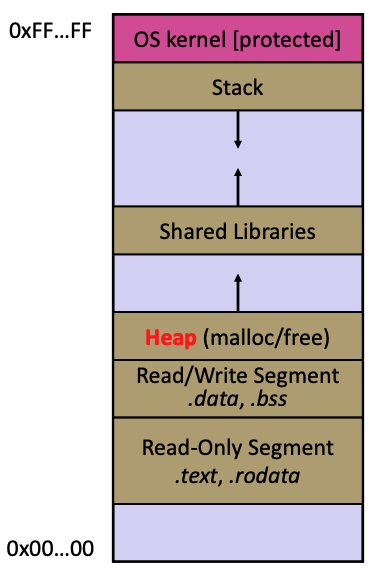CSE333(4-6): Leak
Today, I learnt CSE333 lecture 4 - 6. A concept called Memory Leak is introduced.
Is
Memory leaksimilar toEmotion Leak?
In life, an Emotion Leak may be a type of resource leak that occurs when a Cranial nerve in the brain/mood incorrectly manages emotion allocations in a way that emotion which must be erased is not released.
So unexpected or horrible things will happen.

Lecture 4: The Heap and Structs
Memory Allocation
3 types of memory allocations:
- statically-allocated (global var)
- Allocated when program is loaded
- Deallocated when program exits
- automatically-allocated (local var)
- Allocated when function is called
- Deallocated when function returns
- Dynamic Allocation, when first 2 are not enough
- We need memory that persists across multiple function calls but not for the whole lifetime of the program
- We need more memory than can fit on the stack
- We need memory whose size is not known in advance
Dynamic case example in pseudo-code:
// this is pseudo-C code
char* ReadFile(char* filename) {
int size = GetFileSize(filename);
char* buffer = AllocateMem(size);
ReadFileIntoBuffer(filename, buffer);
return buffer;
}
- dynamically-allocated memory in run-time
- the memory persists until
- the code explicitly deallocate it (manual memory management)
- A garbage collector collects it (automatic memory management)
- C requires to manually manage memory
Aside: NULL
NULL is a memory location that is guaranteed to be invalid.
- In C on Linux, NULL is 0x0 and an attempt to dereference NULL causes a segmentation fault.
- Useful as an indicator of an uninitialized (or currently unused) pointer or allocation error
int main(int argc, char** argv) {
int* p = NULL;
*p = 1; // causes a segmentation fault
return 0;
}
Heap-allocated Memory
malloc() and free()
malloc()
Usage:
var = (type*) malloc(size in bytes)
malloc allocates a block of memory of the requested
size in the heap:
- found in stdlib.h
- Returns a pointer to the first byte of that memory
- And returns NULL if the memory allocation failed
- You should assume that the memory initially contains garbage
- You’ll typically use
sizeofto calculate the size you need
// allocate a 10-float array
float* arr = (float*) malloc(10*sizeof(float));
if (arr == NULL) {
return errcode;
}
... // do stuff with arr
calloc()
- Like malloc, but also zeros out the block of memory in the heap
- found in stdlib.h
- Helpful when zero-initialization wanted (but don’t use it to mask bugs – fix those)
void *calloc(int n, int size);
recalloc()
- Reallocate the void pointer p to be n Bytes, and at the same time it will copy the original content to the new allocated space in the heap. If the original space is less than N bytes, it will keep the same.
- found in stdlib.h
void * realloc(void * p,int n);
free()
- Deallocates the memory pointed-to by the pointer
- Pointer must point to the first byte of heap-allocated memory (i.e. something previously returned by malloc or calloc)
- Freed memory becomes eligible for future allocation
- The bits in the pointer are not changed by calling free
- Defensive programming: can set pointer to NULL after freeing it
- Free the space that pointer p points to.
- found in stdlib.h
void free (void * p);
float* arr = (float*) malloc(10*sizeof(float));
if (arr == NULL) return errcode;
... // do stuff with arr
free(arr);
arr = NULL; // OPTIONAL
The heap
The Heap is a large pool of available memory used to hold dynamically-allocated data.
malloc maintains bookkeeping data in the Heap to track allocated blocks

The heap and stack example given in the lecture notes is very good: page 14 - 24 here
Memory Corruption
Example memcorrupt.c:
#include <stdio.h>
#include <stdlib.h>
int main(int argc, char** argv) {
int a[2];
int* b = malloc(2*sizeof(int));
int* c;
a[2] = 5; // assign past the end of an array
b[0] += 2; // assume malloc zeros out memory
c = b+3; // mess up your pointer arithmetic
free(&(a[0])); // free something not malloc'ed
free(b);
free(b); // double-free the same block
b[0] = 5; // use a freed (dangling) pointer
// any many more!
return 0;
}
Memory leaks
A memory leak occurs when code fails to deallocate dynamically-allocated memory that is no longer used
- e.g. forget to free malloc-ed block, lose/change pointer to malloc-ed block
What happens: program’s VM footprint will keep growing
-
This might be OK for short-lived program, since all memory is deallocated when program ends
-
Usually has bad repercussions for long-lived programs
- Might slow down over time (e.g. lead to VM thrashing)
- Might exhaust all available memory and crash
- Other programs might get starved of memory
-
It cloud be invisible and accumulative, and hard to detect
structs and typedef
structs
- simplestruct.c
struct Point {
float x, y;
};
int main(int argc, char** argv) {
struct Point p1 = {0.0, 0.0}; // p1 is stack allocated
struct Point* p1_ptr = &p1;
p1.x = 1.0;
p1_ptr->y = 2.0; // equivalent to (*p1_ptr).y = 2.0;
return 0;
}
- structassign.c
#include <stdio.h>
struct Point {
float x, y;
};
int main(int argc, char** argv) {
struct Point p1 = {0.0, 2.0};
struct Point p2 = {4.0, 6.0};
printf("p1: {%f,%f} p2: {%f,%f}\n", p1.x, p1.y, p2.x, p2.y);
p2 = p1;
printf("p1: {%f,%f} p2: {%f,%f}\n", p1.x, p1.y, p2.x, p2.y);
return 0;
}

typedef
// make "superlong" a synonym for "unsigned long long"
typedef unsigned long long superlong;
// make "str" a synonym for "char*"
typedef char *str;
// make "Point" a synonym for "struct point_st { ... }“
// make "PointPtr" a synonym for "struct point_st*"
typedef struct point_st {
superlong x;
superlong y;
} Point, *PointPtr; // similar syntax to "int n, *p;"
Point origin = {0, 0};
Dynamically-allocated Structs
mallocandfreestructs
// a complex number is a + bi
typedef struct complex_st {
double real; // real component
double imag; // imaginary component
} Complex, *ComplexPtr;
// note that ComplexPtr is equivalent to Complex*
ComplexPtr AllocComplex(double real, double imag) {
Complex* retval = (Complex*) malloc(sizeof(Complex));
if (retval != NULL) {
retval->real = real;
retval->imag = imag;
}
return retval;
}
Structs as Arguments
- Structs are passed by value, like everything else in C
- Entire struct is copied
- To manipulate a struct argument, pass a pointer instead
void DoubleXBroken(Point p) { p.x *= 2; } // It's broken.
void DoubleXWorks(PointPtr p) { p->x *= 2; } // This works!
Returning Structs
- Often in
%raxand%rdxfor small structs - Often returned in memory for larger structs
- Value passed: passing a pointer is cheaper and takes less space unless struct is small
- Field access: indirect accesses through pointers are a bit more expensive and can be harder for compiler to optimize
Lecture 5: Data Sturctures and Modules
Implement Data Structures in C
- Simple Linked List
manual_list.c
#include <stdio.h>
typedef struct node_st {
int element;
struct node_st* next;
} Node;
int main(int argc, char** argv) {
Node n1, n2;
n1.element = 1;
n1.next = &n2;
n2.element = 2;
n2.next = NULL;
return 0;
}
Push Onto list - Memory Leak
#include<stdio.h>
#include<stdlib.h>
#include<assert.h>
typedef struct node_st {
int element;
struct node_st* next;
} Node;
Node* Push(Node* head, int e) {
Node* n = (Node*) malloc(sizeof(Node));
assert(n != NULL); // crashes if false
n->element = e;
n->next = head;
return n;
}
int main(int argc, char** argv) {
Node* list = NULL;
list = Push(list, 1);
list = Push(list, 2);
return 0;
}
A (benign) memory leak! Try running with Valgrind:
bash$ gcc –Wall -g –o push_list push_list.c
bash$ valgrind --leakcheck=full ./push_list
Install Valgrind
brew install valgrind
Try to run in the docker, or if you are using Mojave MacOS, use the commands below instead, follow this solution: upgrade to 10.15.4, and download ‘Xcode’.
Will try to install tomorrow.
$ brew install automake
$ git clone https://github.com/Echelon9/valgrind.git
$ cd valgrind
$ git checkout feature/v3.14/macos-mojave-support-v2
$ ./autogen.sh
$ ./configure --prefix=/where/you/want/it/installed --enable-only64bit
$ make
Multi-file C Programs
C Preprocessor Intro
- C Header Files
- C Module Conventions
- #include and the C Preprocessor
Lecture 6: Final C Details
Header Guards and Preprocessor Tricks
- Macros
#define ODD(x) ((x) % 2 != 0)
#define WEIRD(x) x % 2 != 0 // Beware of operator precedence issues
- Conditional Compilation
#ifdef TRACE
#define ENTER(f) printf("Entering %s\n", f);
#define EXIT(f) printf("Exiting %s\n", f);
#else
#define ENTER(f)
#define EXIT(f)
#endif
// print n
void pr(int n) {
ENTER("pr");
printf("\n = %d\n", n);
EXIT("pr");
}
Visibility of Symbols
- preprocessor value given in
gcccommand:
gcc -Wall -g -DTRACE -o ifdef ifdef.c
NDEBUGparam will causeassertto expand toempty
gcc -Wall -g -DNDEBUG -o faster useassert.c
Namespace Problem
Q: Is a global variable named ‘counter’ in one C file visible in a different C files in the same program?
extern
- yes if external linkage
- ‘counter’ refers to the same var in both files
- The variable is defined in one file and declared in the other(s)
- When the program is linked, the symbol resolves to one location
- Global variable has external linkage by default.
#include <stdio.h>
extern int counter; // Here, we declare it, and specify external linkage by using the extern specifier
void bar() {
counter++;
printf("(b): counter = %d\n", counter);
}
static
- no if use internal linkage
- ‘counter’ refers to the diff vars in both files
- the variable must be defined in each file
- When the program is linked, the symbol resolves to two locations
static(in the global context) restricts a definition to visibility within that file
#include <stdio.h>
static int counter = 1; // We force internal linkage by using the static specifier.
int main(int argc, char** argv) {
printf("%d\n", counter);
bar();
printf("%d\n", counter);
return 0;
}
Function Visibility
// By using the static specifier, we are indicating
// that foo() should have internal linkage. Other
// .c files cannot see or invoke foo().
static int foo(int x) {
return x * 3 + 1;
}
Good Practise:
- Use static to “defend” your globals, and hide your private stuff.
- Place external declarations in a module’s header file. Header is the public specification.
Haha, congrats, 4th-6th lectures are finished…
